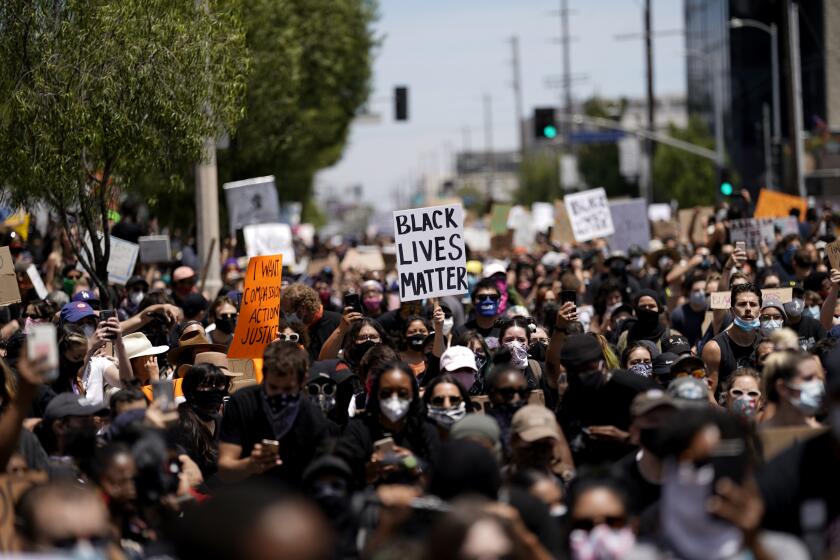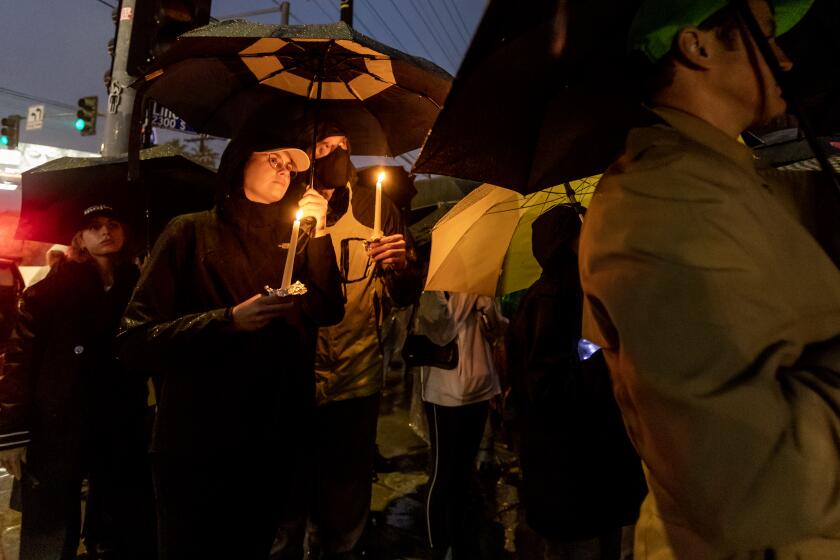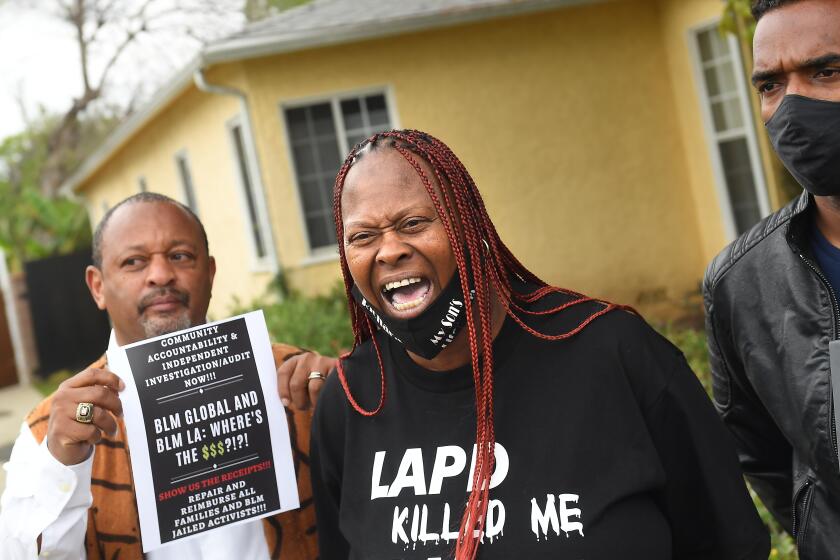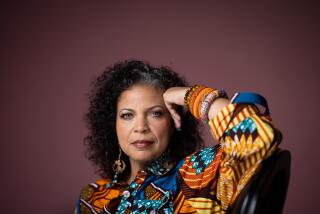After 10 years, is this the beginning of the end for Black Lives Matter?
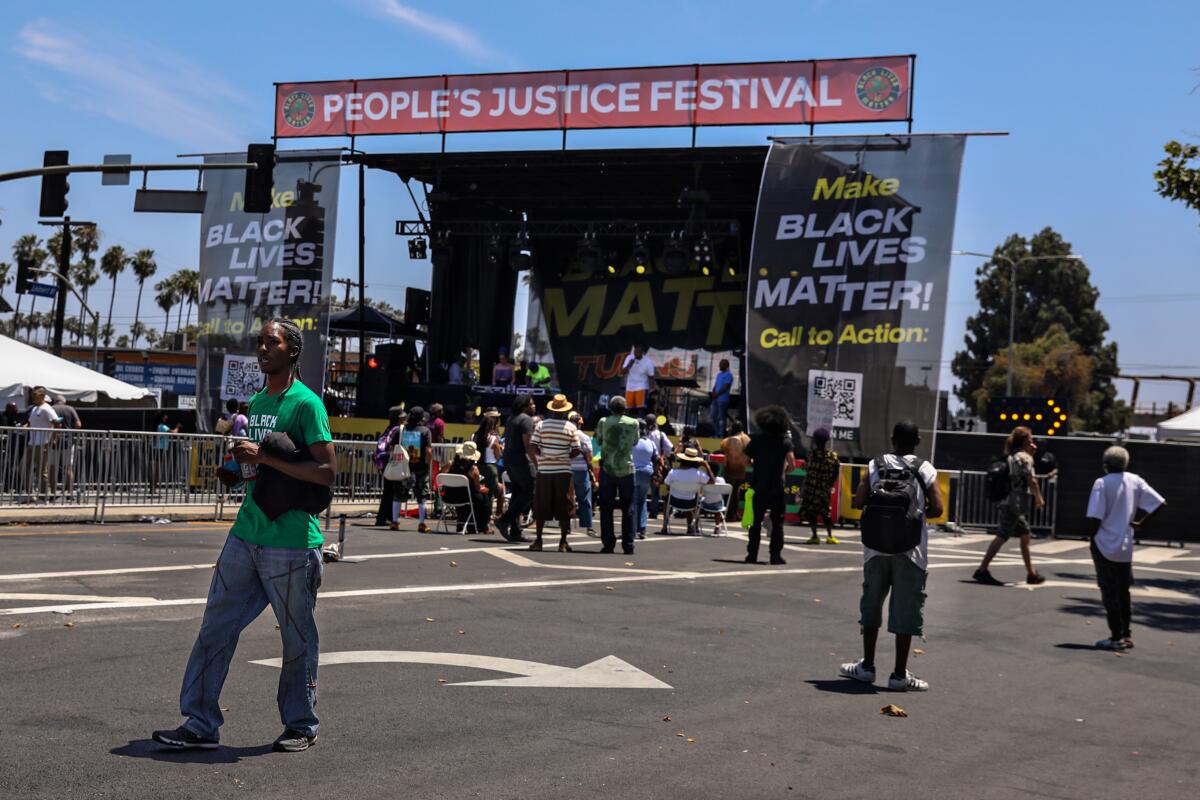
- Share via
The afternoon sun beat down on Leimert Park as Sybrina Fulton, brown-skinned, regal and defiant, took the stage to talk about her son, but mostly about the movement that made sure we’ll never forget his name.
Trayvon Martin.
It was 10 years ago this month that a Florida jury acquitted the man who racially profiled and killed Fulton’s unarmed, baby-faced Black teenager as he walked home from the store wearing a hoodie.
“I definitely had to be here today to celebrate with Black Lives Matter Grassroots ... to make sure that we are still standing with them and they’re still standing with us,” Fulton told dozens of people, hanging on her every word a few feet from the stage. “Our children have the right to walk in peace without being followed, chased, profiled or murdered.”
In a new lawsuit, Black Lives Matter activists allege the leaders of BLM’s nonprofit foundation went rogue and stole millions of dollars in donations.
The case that failed to provide justice for her son served as a racial awakening for a new generation of activists, in no small part because it prompted a budding racial justice activist in L.A. named Patrisse Cullors to go to Facebook (I swear it was popular then) and post “#BlackLivesMatter” as a call-to-action “declaration” for Black people. It worked — unexpectedly well.
“Never, ever would I have imagined that we would change the world the way we have,” Cullors told me recently, reflecting on the past 10 years of a movement that has become so ubiquitous that it’s often reduced to its initials, BLM.
Fulton, like so many other speakers at the People’s Justice Festival in Leimert Park on Saturday, commemorated this history and celebrated a “recommitment” to Black Lives Matter’s future.
But for others, it’s not quite that simple.
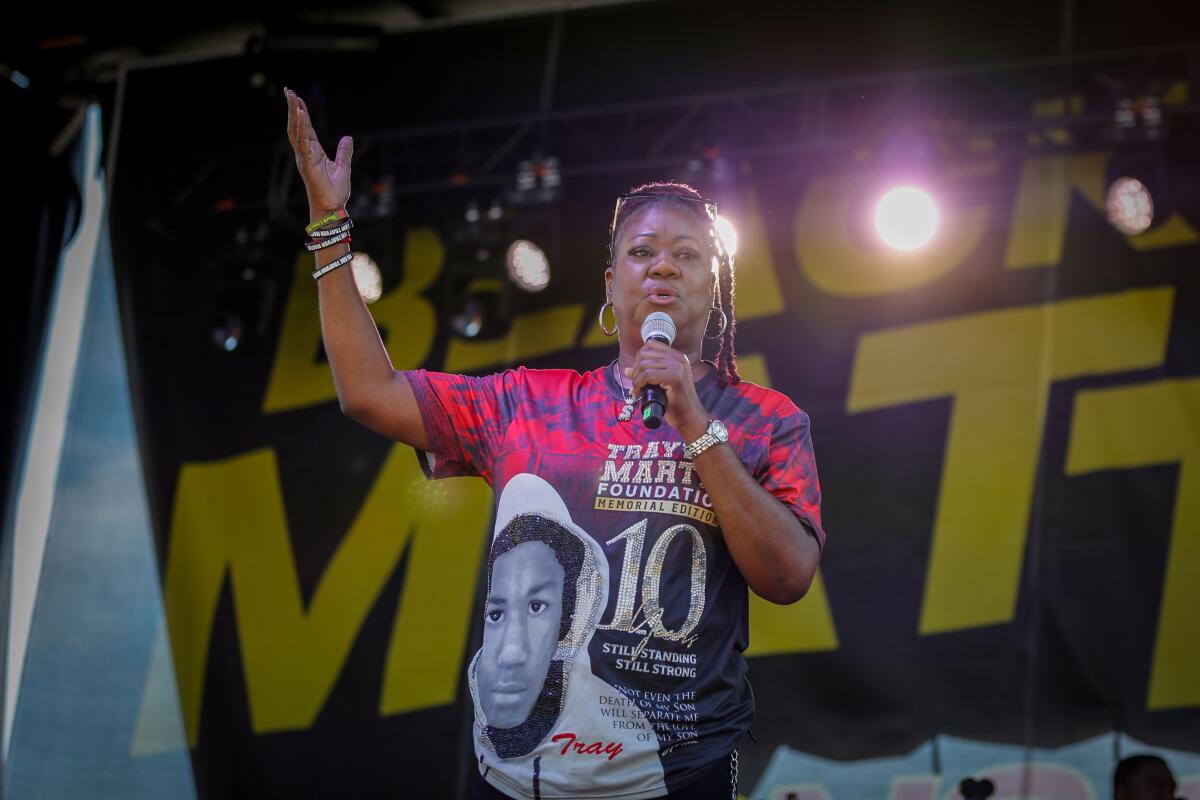
There are nagging worries about the controversies and dysfunction that have rocked the movement in recent years — and now new ramifications over a legal battle that has essentially turned the fundraising arm of BLM and the chapters of activists who spend that funding into direct competitors. More on that later.
There also are fears that the best years could be behind Black Lives Matter at a time when racism is being normalized by far-right Republicans at a rapid pace. There are questions about whether this anniversary could be the beginning of the end.
Few seem willing to say such things publicly. But I’ve certainly heard them whispered in private. For example, one L.A. activist involved in the earliest years of the movement told me the hoopla around BLM’s 10th anniversary feels “more like a memorial than a celebration.”
I wouldn’t go that far. Not after attending the People’s Justice Festival, where hundreds of people braved the heat to show solidarity, even though the initial turnout was far less than organizers anticipated.
Still, it’s not hard to understand why someone would say such a thing.
Polls continue to show a slow decline in various forms of support for Black Lives Matter. A recent poll from Pew Research Center found that backing for the movement is now at its lowest point in three years — down to 51% from 67% in 2020, the year George Floyd was killed by Minneapolis police.
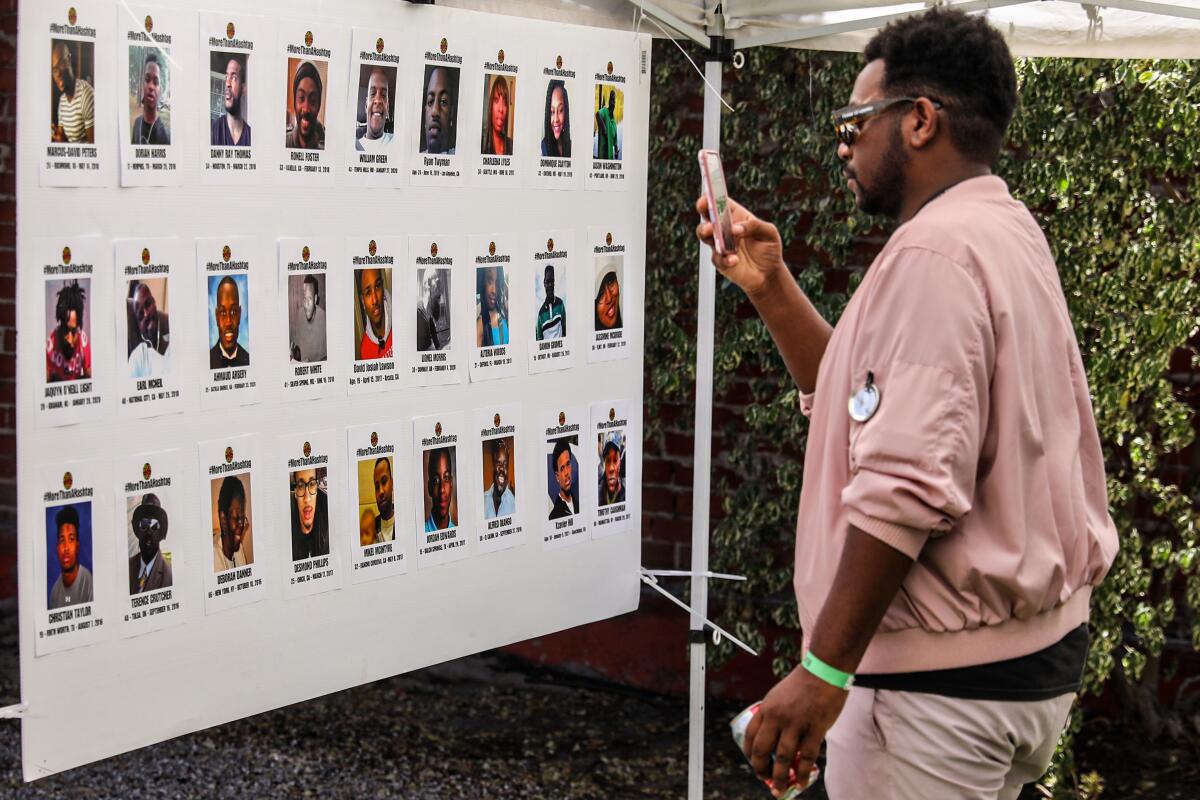
The disproportionate killing and maiming of Black people by police barely grabs people’s attention anymore. The exceptions tend to be cases that are especially brutal — like Tyre Nichols getting chased down and beaten to death by a gang of cops in Memphis or a Los Angeles County sheriff’s deputy punching a woman holding a baby.
And so it tracks that the killing and maiming of Black people also no longer inspires as many Americans (or deep-pocketed corporations) to donate money to racial justice organizations.
Of course, it hasn’t helped that a series of widely publicized scandals — some real, some exaggerated and some completely imagined — have eroded public trust in several of these organizations, including, but not limited to, BLM. It all just feels messy.
Cullors, who stepped down two years ago after a rocky stint as executive director of the Black Lives Matter Global Network Foundation, has admitted that she made mistakes and that she was ill-prepared for the sudden crush of demands and donations after Floyd was killed.
But “when you’re living in a white supremacist, capitalist country,” she told me recently, “movements that are for Black liberation are really difficult to sustain.” Indeed, history is full of examples.
Nevertheless, Black Lives Matter remains powerful, particularly as a brand. It’s on T-shirts and murals. Type the three words into your iPhone, and it will automatically capitalize them.
The rise of the movement is taught in classrooms. Parents discuss it with their children. And now, previously wonky concepts, such as systemic racism, white privilege and equity (rather than equality), are part of the everyday lexicon of millions of Americans.
And so when I ask Cullors what she thinks will happen to the movement she helped create with friends Alicia Garza and Ayọ Tometi, and her response is “it’s too soon to tell,” I get it.
“I’m surprised,” she admitted ruefully, “we lasted 10 years.”
::
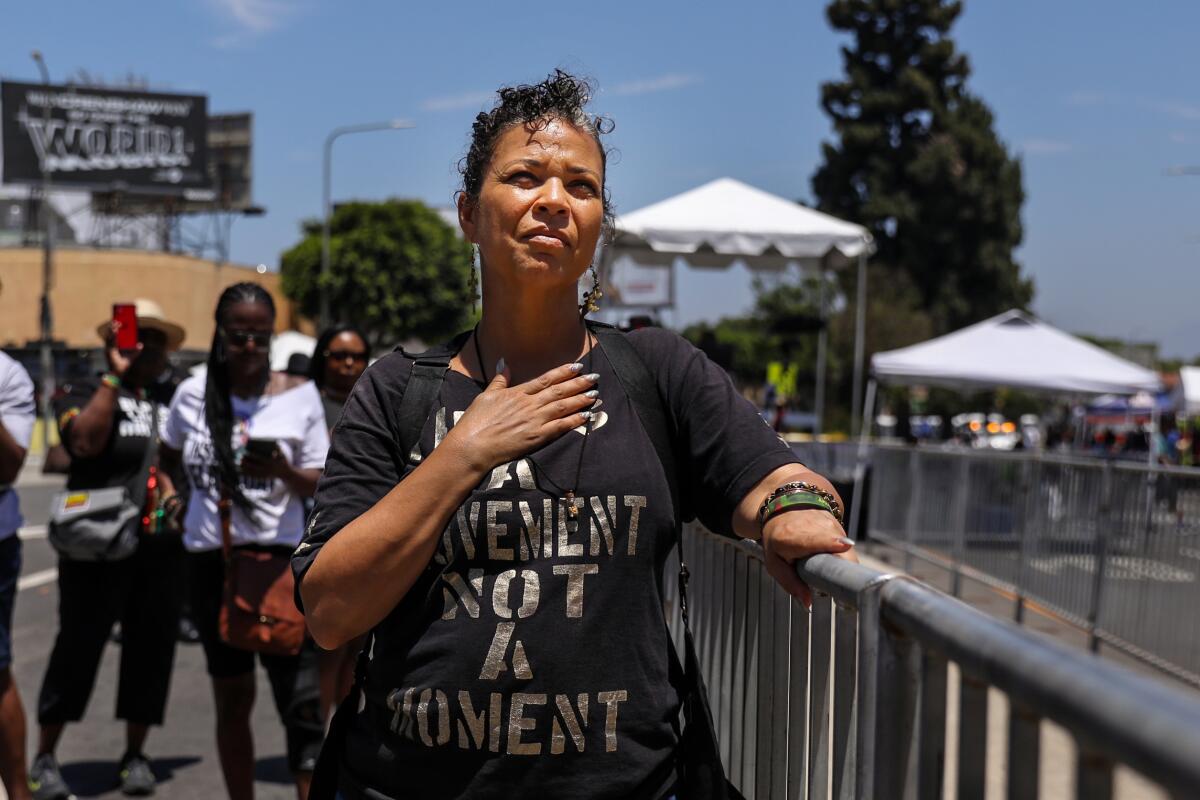
To truly understand the challenges facing Black Lives Matter, one must first understand what Black Lives Matter truly is.
Yes, it’s a decentralized movement of activists, primarily pushing for racial justice and an end to police brutality. But it’s also a collection of individual organizations.
One is the Black Lives Matter Global Network Foundation, a nonprofit registered with the Internal Revenue Service. Until recently, it served as the main fundraising arm of BLM and, as such, accepted the vast majority of donations to the movement and distributed that money to activists working in dozens of official chapters, of which L.A.’s is the first in existence.
Then things changed.
Cullors stepped down from her leadership role with the foundation, and a new board of directors, most of them unknown to the activist class but more experienced in helping manage large nonprofits, stepped in. They had a different vision for Black Lives Matter and went about implementing it.
“We all agreed to formally end our affiliations with the chapters in order to allow them autonomy to work in a way that they saw fit,” foundation board member Shalomyah Bowers told me. “But also in order for them to do direct fundraising because, for many of them, they were solely reliant on the Global Network Foundation.”
Keenan Anderson, cousin of a BLM founder, is among three men of color who have died this year after encounters with LAPD officers. A vigil was packed.
Not everyone within BLM agreed with this vision. Melina Abdullah, founder of Black Lives Matter-L.A., took particular issue with it, accusing Bowers of not being a real activist because he hasn’t been involved with protests. She also objected to the foundation’s continued use of the movement’s main social media accounts.
So she pulled together more than 30 BLM chapters to form a separate organization, Black Lives Matter Grassroots. More bickering ensued. Then, last September, a family-feud-style legal battle broke out.
BLM Grassroots sued the BLM foundation in Los Angeles County Superior Court, singling out Bowers, and alleging misrepresentation, mismanagement and financial malfeasance. But in late June, a judge dismissed the lawsuit based on a broader legal tenet, resolving nothing and leaving BLM Grassroots and the BLM foundation more or less permanently at odds, as an appeal could take years.
Now BLM Grassroots has registered with the IRS as a nonprofit, too — and has started accepting donations. Both organizations stake a claim to being the real Black Lives Matter.
“If we don’t get anything back but our name, in my view, that’s one of the most important things,” Abdullah explained recently. “Because we want to make sure that we represent Black Lives Matter in the way that we intended.”
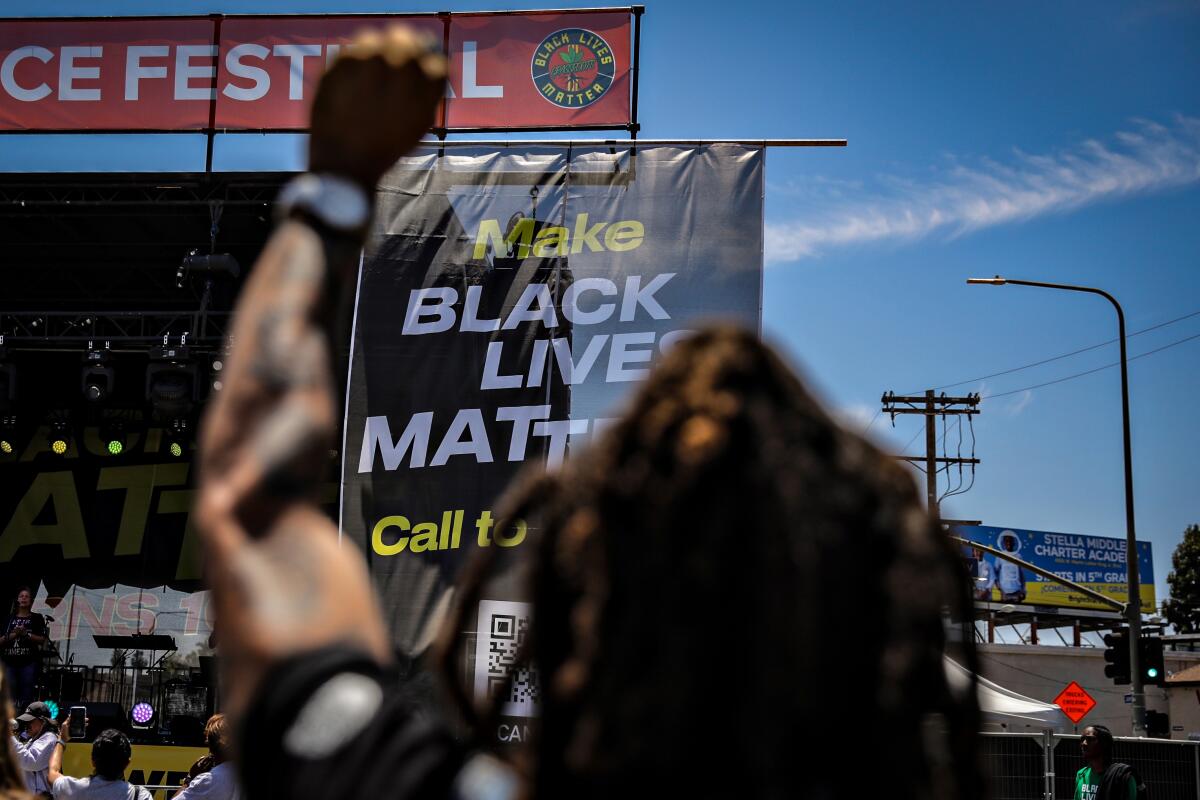
Why am I telling you all of this?
Because whether this movement lasts for another 10 years may very well depend on whether the two largest and most important organizations within it can agree to stop competing with each other, and instead find a more cooperative way forward that rebuilds public trust.
For starters, there’s only so much money to go around. In its latest filing with the IRS, the Black Lives Matter foundation raised only about $9 million in its last fiscal year, as the stream of donations tied to the nation’s short-lived racial reckoning continued to dry up. Compare that to 2020, when the haul was roughly $90 million.
But even if the BLM foundation and BLM Grassroots could come together on fundraising, they still have different visions for the movement.
Abdullah sees a future largely based on community organizing, much as it has been for the past 10 years. Of course, there’s been an evolution from the early days of shutting down freeways and, occasionally, the commercial core of Beverly Hills.
“Black Lives Matter Grassroots has committed to using every tool,” she told me. One example is the policy-focused People’s Budget, which provides an alternative, community-driven list of economic priorities to the mayor and L.A. City Council every budget cycle.
But protests remain important.
Column: There’s a fight over the direction of Black Lives Matter. The timing couldn’t be worse
For years, activists have been questioning what Black Lives Matter does with the donations it gets. Those questions have turned to accusations.
Bowers and Cicley Gay, who recently became chair of the board of directors of the BLM foundation, see themselves as more aspirational. They want to “disrupt philanthropy” by being a Black-led nonprofit that supports “radical change makers” with money and resources for practical things, such as building a communications strategy.
They also want BLM to consistently focus on more than just police brutality.
“We will never abandon that. But this is a moment where if our real goal is to end white supremacy, that can’t just be relegated to the criminal punishment systems,” Bowers told me.
“It’s how do we expand the vision that we, as Black people, care about breathable air and clean water,” he added. “We care about housing affordability. We care about economic opportunity and transforming the way that our economy works. That requires a shift in how society relates to this organization.”
::
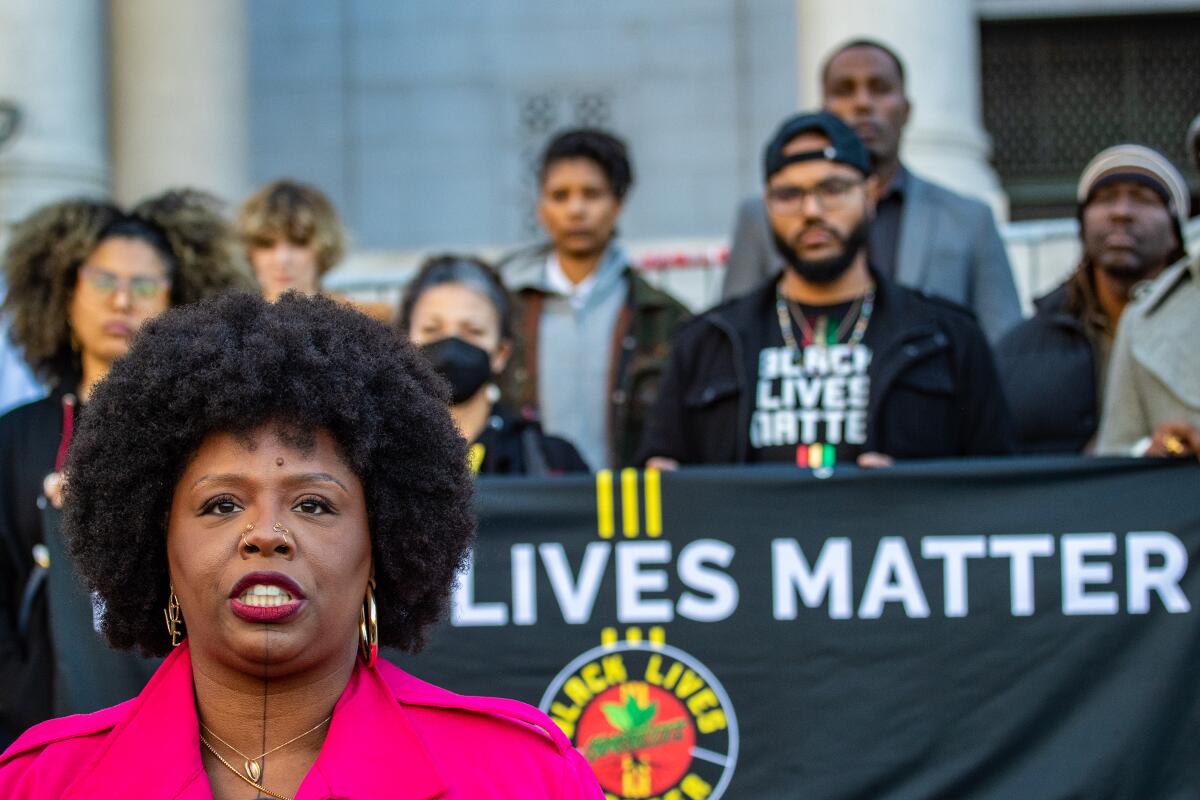
So after 10 years, is this the beginning of the end for Black Lives Matter? Or just a new beginning?
“Every generation has an opportunity to advance, and involve the conditions for Black people. And we did,” said Cullors, now on the outside of the movement looking in. “It’s not over. Black liberation never dies. It has lulls and this is a lull.”
Surely, there will be more protests, more pushes for legislative change, more community organizing and more calls for reparations and economic development.
“At the end of the day,” she added, “Black people need power, we need autonomy and we need self-determination.”
Fulton would call that “persistence.” Pushing forward, she told the crowd in Leimert Park on Saturday, is how she survived the killing of her son and thrived by building the Trayvon Martin Foundation to prevent other young Black men from suffering the same fate.
“Black Lives Matter,” she said, matter-of-factly. “Regardless of what’s going on, Black Lives Matter. I lost my 17-year-old son. I’m not gonna let you give up.”
More to Read
Sign up for Essential California
The most important California stories and recommendations in your inbox every morning.
You may occasionally receive promotional content from the Los Angeles Times.
